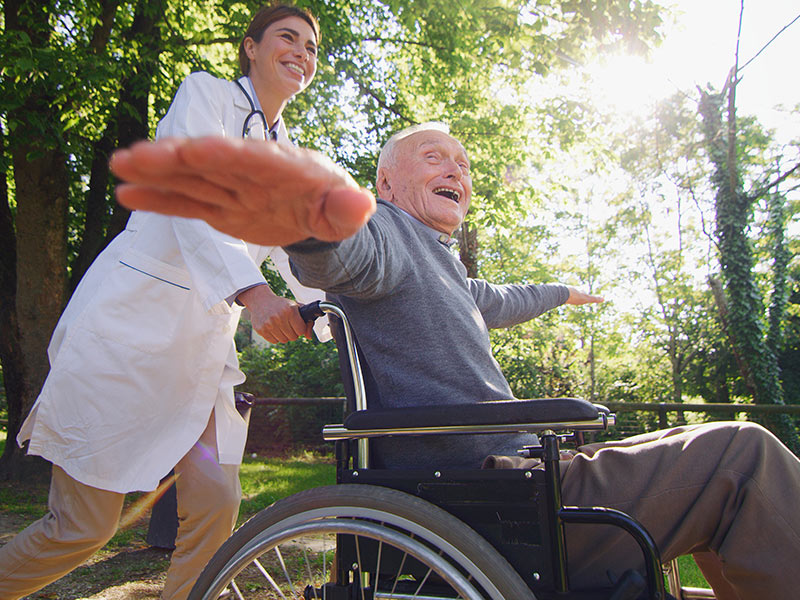Cardiopulmonary Diseases
Congestive heart failure (CHF) may be caused by a number of disorders, including coronary artery disease, hypertension and valvular heart disease. Patients with mild CHF may be comfortable at rest, but notice limitations during physical activity, such as fatigue, palpitations, or shortness of breath. More severe symptoms may include weight gain, edema, a rapid respiratory rate, wheezing and severe respiratory distress.

The Oxitone platform, by monitoring a patient's vital signs 24/7 and transmitting the data to the health care provider, can help detect early signs of worsening of CHF and can inform the patient of steps to take to improve the clinical situation. A decrease in arterial oxygen saturation, an increased heart rate and/or an increased respiratory rate may be indicators of worsening CHF. If deterioration of CHF is detected early, an increase in medication dosage or the administration of additional medications may reverse the condition and prevent admission to hospital.
Obstructive Sleep Apnea
Safe and effective return to productive work with sleep apnea screening using a wrist sensor device. Obstructive sleep apnea (OSA) is a temporary airway collapse of the soft airways due to loss in muscle tone during sleep, causing a drop in blood oxygen levels as a result of airway obstruction and temporarily awakenings resulting in activation of stress physiology. The effects of OSA include fatigue, impaired job performance, sleepiness and an increased accident risk (which is specifically relevant to safety critical industries).

Several chronic diseases, such as high blood pressure, ischemic heart disease and diabetes are linked to OSA. Prevalences of OSA of over 10% have been reported in the general population. [1] It is therefore important to screen a workforce for OSA, especially as work performance and safety is affected by OSA. The STOPBANG questionnaire [2] is a screening tool used in primary care clinics to screen for OSA. The diagnosis of OSA depends on a clinical sleep study with measurement of physiology during sleep in a sleep clinic. Moderate to severe forms of OSA can also be diagnosed by a technically adequate device [3], such as the peripheral wrist sensor device of Oxitone that measures the dips in arterial oxygen saturation and heart rate measures. The patient could sleep comfortably at home for 1-2 nights with the Oxitone wrist sensor device, without
the need for having multiple sensors attached to the patient. Devices could be posted to the patient to avoid the need to travel to a healthcare facility, with a sleep physician accessing the data remotely, improving the patient experience in the OSA screening process.
OSA is easily treatable with treatment modalities such as oral appliances, conservative measures such as weight loss and CPAP (Continuous Positive Airway Pressure) ventilation.
It is therefore possible to make an earlier diagnosis of OSA with the Oxitone device, resulting in potentially earlier access to treatment and returning to working safely with improved job performance within a matter of days (and not months to conclude an OSA diagnosis as before).
Oxitone is currently busy with research in collaboration with the London Sleep Centre in a study to screen for OSA.
References:
1. http://aasm.org/resources/pdf/sleep-apnea-economic-crisis.pdf (Accessed 10/3/2019)
2. http://www.stopbang.ca/osa/screening.php (Accessed 10/3/2019)
3. Kapur VK, Auckley DH, Chowdhuri S, Kuhlmann DC, Mehra R, Ramar K, Harrod CG. Clinical practice guideline for
diagnostic testing for adult obstructive sleep apnea: an American Academy of Sleep Medicine clinical practice
guideline. J Clin Sleep Med. 2017;13(3):479–504.
Physiological Stress
Improve sustainable performance of your workforce with personalized stress measurements: More medical evidence is emerging that heart rate variability (HRV) measurements [1] and sleep parameters [2] are objective measures to use to assess psychological stress. Sustainable good job performance requires recovery from stress with overnight rest. Occupational stress is associated with fatigue, burnout, poor job performance, higher accident rates and increased sickness absenteeism from work. [2, 3]

Occupational stress is assessed clinically with the use of stress questionnaires based on subjective self-reporting without any objective measures.
Objective measurement of the physiological parameters of stress with a medical grade wrist sensor Oxitone device, has disruptive potential in occupational stress assessments. An occupational health professional is able to provide advice to the employee through the healthcare portal linked to the Oxitone device, which enables the health professional to provide personalized healthcare advice remotely. Healthcare professionals could interpret the medical grade data over time and build associations of exposure to stress and recovery on working and non-working days, give advice on sleep patterns, give wellbeing advice to employees (patients) and advise on workplace adjustments to employers. The result is likely to be sustainable and measurable added value to workforce productivity, worker health and a reduction in employee attrition rates.
Several chronic diseases such as ischemic heart disease, diabetes, insomnia disorder and depression have been linked to occupational stress. [2,4,5] Prevention of psychological stress based on objective stress measurements are likely to initiate preventative actions from employees and employers supported by occupational health professionals and subsequently protect employees against risk factors for the above diseases whilst promoting a healthy workforce with economical benefit.
Stress that is “measurable” it is better “manageable” for employers, employees and healthcare professionals. Employers are then likely to fulfill their legal obligation of duty of care, overseeing the wellbeing of their employees with such objective assessments of occupational stress. [6] Oxitone plans to start trials in objective stress measurements in UK healthcare workers in 2019/2020.
References:
1. Kim H, Cheon E, Bai D, Lee YH, Koo B. Stress and heart rate variability: A meta-analysis and review of the literature.
Psychiatry Investig 2018, 15(3): 235-245
2. Akersted T. Psychological stress and impaired sleep. Scand J Work Environ Health 2006;32(6, special issue):493–501
3. Robroek SJW, Schuring M, Croezen S, Stattin M, Burdorf A. Poor health, unhealthy behaviors, and unfavorable work
characteristics influence pathways of exit from paid employment among older workers in Europe: a four year follow-up
study. Scand J Work Environ Health. 2013;39(2):125–133.
4. Kivimäki M, Steptoe A. Effects of stress on the development and progression of cardiovascular disease. Nat Rev
Cardiol 2018; 15: 215–29.
5. Lian Y, Sun Q, Guan S, Ge H, Tao N, Jiang Y, et al. Effect of changing work stressors and coping resources on the risk
of type 2 diabetes: the OHSPIW cohort study. Diabetes Care 2018; 41: 453–60.
6. https://www.hse.gov.uk/stress/standards/index.htm (Accessed October 3 2019)
